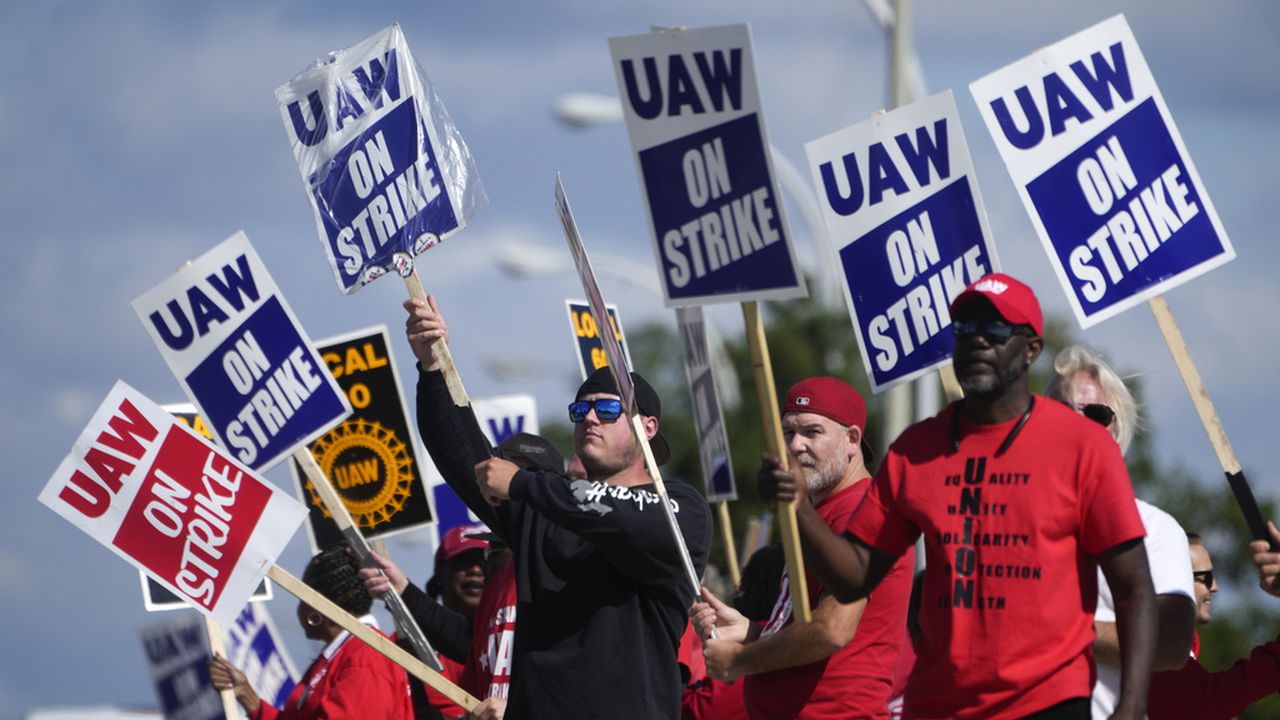What UAWâs agreements with Big 3 automakers means for the labor movement
The United Auto Workers (UAW) reached a tentative agreement with General Motors (GM) Monday, marking an end to a six week strike against America’s “Big Three” automakers and a changing tide for the labor movement.
Last week saw the union reach agreements with Ford and Stellantis that secure wage hikes, retirement benefits and a pathway to permanent employment for workers as automakers’ losses piled up. More than 40,000 UAW members have walked off the job since the union began striking in September, costing automakers $9.3 billion in profits.
UAW President Shawn Fain and Vice President Chuck Browning have led workers in a series of “stand-up” strikes, at some of the biggest auto plants in the country, ordering workers at select locations to walk off the job with very little notice.
When Fain and Browning called for a strike at the largest GM plant in North America on Saturday, 3,200 employees walked off the job at the 11-million-square-foot Spring Hill Manufacturing Plant in Tennessee. GM expressed disappointment at the union’s action “in light of the progress we have made,” a statement read.
But by Sunday the automaker and the union seemed to have come to an agreement.
The surprise tactic had earned workers their first deal earlier in the week when UAW reached an agreement with Ford, after nearly 9,000 workers walked off the job at a Kentucky truck plant — one of the largest auto factories in the world — with no warning.
In addition to $8.1 billion in plant investment, the new contract includes a 25 percent wage increase over the life of the four and a half year contract with an immediate 11 percent raise upon its ratifiction. It also restores an annual cost of living adjustment (COLA) that keeps wages in line with inflation, which workers lost in 2009. Other benefits include a faster track to permanent worker status for temporary workers, and more.
The next day UAW reached a tentative deal with Stellantis, where more than 14,000 workers at the automaker’s assembly plants and parts warehouses had been on strike for six weeks. It also won the re-opening of a plant in Belvidere, Illinois, which closed in 2022.
“Once again, we have achieved what just weeks ago we were told was impossible,” Fain said in a written statement. “At Stellantis in particular, we have not only secured a record contract, we have begun to turn the tide in the war on the American working class.”
Many experts have marked the strikes as a turning point in the labor movement, which gains momentum with each big win. As auto workers held the line, Starbucks baristas, UPS delivery drivers, Hollywood writers and healthcare workers all won hard-fought battles over workplace inequalities.
The UAW have encouraged workers across all industries to model their contracts after the UAW’s, including the expiration date. UAW retains the power to ratify their contracts until they expire on April 30, 2028 — one day before May Day, a holiday that commemorates the social and economic achievements of workers worldwide.
Fain told listeners during a speech in Detroit Sunday the date was chosen strategically.
“May Day was born out of the intense struggle by workers in the United States to win an eight-hour day. That’s a struggle that is just as relevant today as it was in 1889,” he said. “Even though May Day has its roots here in the United States, it is widely celebrated by workers all over the world. It’s more than just a day of commemoration, it’s a call to action.”
